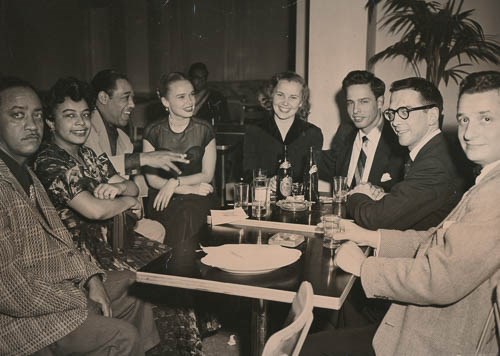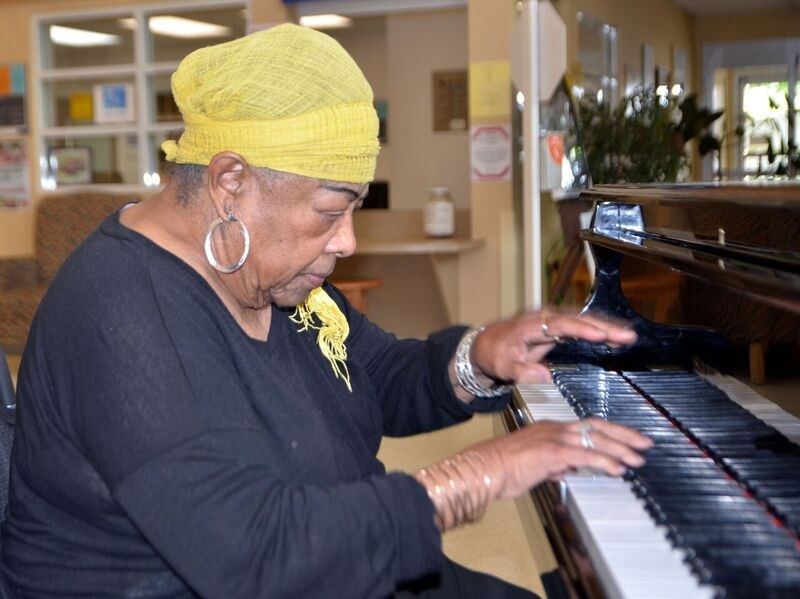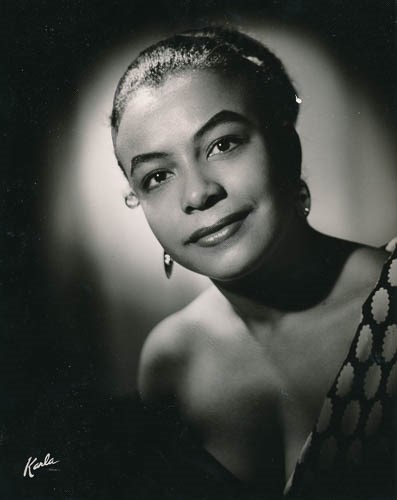
From the moment music therapist Leah Rosling plays the first song — George Gershwin is featured today — a dozen or so residents break into smiles as they remember familiar lyrics. Eve Duke, age 91, closes her eyes and sways to the beat, her index finger tapping to the tune.
“Who’s singing that — I haven’t heard that voice since I was a little kid,” says Duke, who has lived at Providence Health Care’s St. Vincent’s Langara residential care home for the past year.
Music therapy is Duke’s favourite program. No wonder, considering her distinguished career as a jazz singer and pianist and most notably as a protégé of renowned band leader and musician Duke Ellington (no relation).
“I had the pleasure to sing with Duke Ellington and his band for three years. He was intelligent and very kind — a great gentleman — and I learned a lot from him,” says Duke.
Rosling describes Duke as a brilliant musician, deeply compassionate and kind. Having been in the spotlight most of her life, she’s also a bit of a diva.
“She was incredibly beautiful with a good education. But growing up as a black woman in Washington, DC, she holds a lingering resentment,” Rosling explains, “and she doesn’t suffer fools gladly.”

Because Duke has so many accomplishments it was difficult for her to move into the care home, but when she plays the piano and sings, she becomes a musician again. And being appreciated by residents and staff gives her a sense of accomplishment.
“I love discovering things and you’re never too old to learn,” Duke says with a chuckle. “You’ve got to keep the brain working and that’s where music comes in.”
Rosling, a music therapist for 31 years, has seen many people struggle when they’re first placed in care — often new residents are depressed and isolate themselves. Music therapy starts with Rosling visiting their room with her guitar or keyboard and allowing new residents to talk about whatever is on their mind. Sometimes they’ll request a song or, if not, Rosling will play something they may like. Above all, she listens.
“Each resident has a remarkable history that we may not know about,” Rosling says. “By encouraging participation, they have a chance to feel valued, they are able to contribute.” And by tapping into their memory, colleagues see them differently, perhaps with more respect. Rosling often gets referrals from psychiatrists and social workers to help people through music therapy.
“Sometimes it takes months before they feel confident to participate in a group, but it is inspiring when they get it.”
Rosling remembers an 80-something Irish woman who was agoraphobic before coming into care. She wouldn’t leave her room, only ate chocolate and ice cream and wouldn’t get dressed. It took some time to discover the woman had lots to talk about. She told Rosling she came to Canada as a maid, “green as leeks.” Gradually the woman was able to get herself dressed. They sang Irish songs together and Rosling played keyboard.
“She began to dance and wore special hats. I got her outside to a park and she put her feet on green grass — she hadn’t done that for years. Eventually she came to group therapy sessions where residents welcomed her. She looked content,” Rosling remembers.
She notes music therapy is mainly about triggering long term memory, particularly essential for people dealing with cognitive issues. And that was was making a difference on this day. Next up, Rosling plays “Summertime.”
“This song is melodic and beautiful, it takes you back to 1940s summers,” says long-time resident Helen, as she harmonizes along with the great jazz singer Sarah Vaughan.
Then Rosling introduces the next Gershwin tune, “It ain’t” and everyone chimes in on the second line, “Necessarily so.”
Meanwhile, Eve Duke tells Rosling today’s music is “lousy” and there’s nothing on the radio worth listening to.
“That’s why we have these music sessions,” quips Rosling.
“Thank God for small mercies,” Duke says.
And thanks for the memories.
janevm@telus.net



